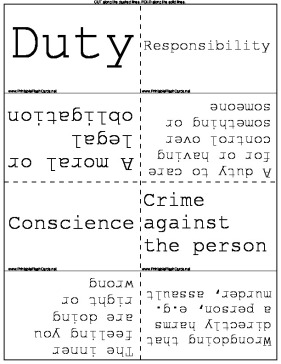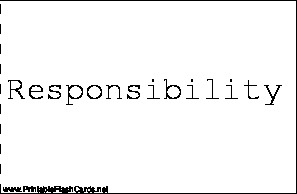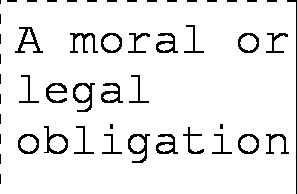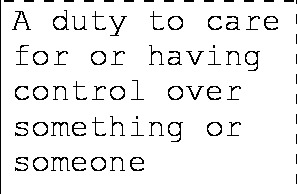

Teach young students the basics of law, crime, and punishment with these keyword flash cards.
There are 26 flash cards in this set (7 pages to print.)
To use:
1. Print out the cards.
2. Cut along the dashed lines.
3. Fold along the solid lines.
Sample flash cards in this set:




| Questions | Answers |
|---|---|
| Duty | A moral or legal obligation |
| Responsibility | A duty to care for or having control over something or someone |
| Conscience | The inner feeling you are doing right or wrong |
| Crime against the person | Wrongdoing that directly harms a person, e.g. murder, assault |
| Crime against property | Damaging items that belong to somebody else, e.g. vandalism |
| Crime against the state | An offence aimed at damaging the government or a country, e.g treason |
| Religious offence | An offence against religion, e.g. blasphemy, sacrilege |
| Punishment | Something done to a person because they have broken the law |
| Reparation | An aim of punishment designed to help an offender to put something back to society |
| Vindication | An aim of punishment that means offenders must be punished to show that the law must be respected and is right |
| Protection | Keeping the public from being harmed, threatened or injured by criminals |
| Deterrence | An aim of punishment- to put people off committing crimes |
| Forgiveness | Being truly sorry and trying to change one's behaviour so as not to do the same again |
| Repentance | Being truly sorry and trying to change one's behaviour so as not to do the same again |
| Young offender | A person under 18 who has broken the law |
| Imprisonment | When a person is put in jail for committing a crime |
| Prison reform | A movement that tries to ensure offenders are treated humanely in prison |
| Death penalty | |
| Community service | Unpaid work that an offender performs for the benefit of the local community rather than going to prison |
| Probation | An alternative to prison where an offender has to meet regularly with a probation officer to ensure that they do not re-offend. Movement may be restricted. |
| Fine | Money paid as a punishment for a crime or other offence |
| Electronic tagging | An offender has to wear an electronic device which tracks their movement to ensure restrictions of movement observed |
| Community service | Unpaid work that an offender performs for the benefit of the local community rather than going to prison |
| Early release | When a prisoner is allowed out of prison even though they have not completed their sentence, or fulfilled the criteria for getting parole |
| Life imprisonment | A prison sentence that(theoretically) keeps people in prison until they die |
| Parole | When a prisoner is released without having completed their sentence, because they have behaved well and accepted their guilt. The prisoner is monitored to try to ensure that they do not re-offend. |